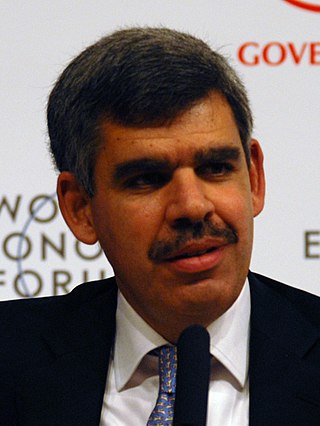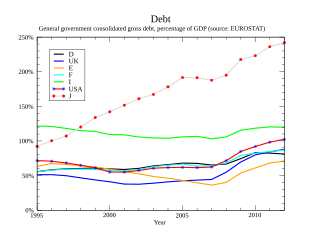In economics, a recession is a business cycle contraction that occurs when there is a period of broad decline in economic activity. Recessions generally occur when there is a widespread drop in spending. This may be triggered by various events, such as a financial crisis, an external trade shock, an adverse supply shock, the bursting of an economic bubble, or a large-scale anthropogenic or natural disaster. There is no official definition of a recession, according to the IMF.

Joseph Eugene Stiglitz is an American New Keynesian economist, a public policy analyst, political activist, and a professor at Columbia University. He is a recipient of the Nobel Memorial Prize in Economic Sciences (2001) and the John Bates Clark Medal (1979). He is a former senior vice president and chief economist of the World Bank. He is also a former member and chairman of the US Council of Economic Advisers. He is known for his support for the Georgist public finance theory and for his critical view of the management of globalization, of laissez-faire economists, and of international institutions such as the International Monetary Fund and the World Bank.
Neoliberalism is both a political philosophy and a term used to signify the late-20th-century political reappearance of 19th-century ideas associated with free-market capitalism. The term has multiple, competing definitions, and is often used pejoratively. In scholarly use, the term is often left undefined or used to describe a multitude of phenomena. However, it is primarily employed to delineate the societal transformation resulting from market-based reforms.

An economic bubble is a period when current asset prices greatly exceed their intrinsic valuation, being the valuation that the underlying long-term fundamentals justify. Bubbles can be caused by overly optimistic projections about the scale and sustainability of growth, and/or by the belief that intrinsic valuation is no longer relevant when making an investment. They have appeared in most asset classes, including equities, commodities, real estate, and even esoteric assets. Bubbles usually form as a result of either excess liquidity in markets, and/or changed investor psychology. Large multi-asset bubbles, are attributed to central banking liquidity.

Nouriel Roubini is a Turkish-born Iranian-American economic consultant, economist, speaker and writer. He is a Professor Emeritus since 2021 at the Stern School of Business of New York University.

Pacific Investment Management Company LLC is an American investment management firm focusing on active fixed income management worldwide. PIMCO manages investments in many asset classes such as fixed income, equities and other financial assets across public and private markets. PIMCO is one of the largest investment managers, actively managing more than $2 trillion in assets for central banks, sovereign wealth funds, pension funds, corporations, foundations and endowments, and individual investors around the world. According to the Sovereign Wealth Fund Institute, PIMCO is the 6th-largest asset manager in the world by managed AUM.

Martin Harry Wolf is a British journalist who focuses on economics. He is the chief economics commentator at the Financial Times. He also writes a weekly column for the French newspaper Le Monde.
The Austrian business cycle theory (ABCT) is an economic theory developed by the Austrian School of economics seeking to explain how business cycles occur. The theory views business cycles as the consequence of excessive growth in bank credit due to artificially low interest rates set by a central bank or fractional reserve banks. The Austrian business cycle theory originated in the work of Austrian School economists Ludwig von Mises and Friedrich Hayek. Hayek won the Nobel Prize in Economics in 1974 in part for his work on this theory.
In macroeconomics, inflation targeting is a monetary policy where a central bank follows an explicit target for the inflation rate for the medium-term and announces this inflation target to the public. The assumption is that the best that monetary policy can do to support long-term growth of the economy is to maintain price stability, and price stability is achieved by controlling inflation. The central bank uses interest rates as its main short-term monetary instrument.

Mark Alan Weisbrot is an American economist and columnist. He is co-director with Dean Baker of the Center for Economic and Policy Research (CEPR) in Washington, D.C. Weisbrot is President of Just Foreign Policy, a non-governmental organization dedicated to reforming United States foreign policy.
Economic stability is the absence of excessive fluctuations in the macroeconomy. An economy with fairly constant output growth and low and stable inflation would be considered economically stable. An economy with frequent large recessions, a pronounced business cycle, very high or variable inflation, or frequent financial crises would be considered economically unstable.

Branko Milanović is a Serbian-American economist. He is most known for his work on income distribution and inequality.

The Greenspan put was a monetary policy response to financial crises that Alan Greenspan, former chair of the Federal Reserve, exercised beginning with the crash of 1987. Successful in addressing various crises, it became controversial as it led to periods of extreme speculation led by Wall Street investment banks overusing the put's repurchase agreements and creating successive asset price bubbles. The banks so overused Greenspan's tools that their compromised solvency in the 2007–2008 financial crisis required Fed chair Ben Bernanke to use direct quantitative easing. The term Yellen put was used to refer to Fed chair Janet Yellen's policy of perpetual monetary looseness.

Mohamed Abdullah El-Erian is an Egyptian-American economist and businessman. He is President of Queens' College, Cambridge, and chief economic adviser at Allianz, the corporate parent of PIMCO where he was CEO and co-chief investment officer (2007–14). He was chair of President Obama's Global Development Council (2012–17), and is a columnist for Bloomberg View, and a contributing editor to the Financial Times.

The Great Moderation is a period of macroeconomic stability in the United States of America coinciding with the rise of independent central banking beginning from 1980 and continuing to the present day. It is characterized by generally milder business cycle fluctuations in developed nations, compared with decades before. Throughout this period, major economic variables such as real GDP growth, industrial production, unemployment, and price levels have become less volatile, while average inflation has fallen and recessions have become less common.

The Great Recession was a period of market decline in economies around the world that occurred from late 2007 to mid-2009. The scale and timing of the recession varied from country to country. At the time, the International Monetary Fund (IMF) concluded that it was the most severe economic and financial meltdown since the Great Depression.

Following the global 2007–2008 financial crisis, there was a worldwide resurgence of interest in Keynesian economics among prominent economists and policy makers. This included discussions and implementation of economic policies in accordance with the recommendations made by John Maynard Keynes in response to the Great Depression of the 1930s, most especially fiscal stimulus and expansionary monetary policy.

Debt crisis is a situation in which a government loses the ability of paying back its governmental debt. When the expenditures of a government are more than its tax revenues for a prolonged period, the government may enter into a debt crisis. Various forms of governments finance their expenditures primarily by raising money through taxation. When tax revenues are insufficient, the government can make up the difference by issuing debt.

The expression "everything bubble" refers to the correlated impact of monetary easing by the Federal Reserve on asset prices in most asset classes, namely equities, housing, bonds, many commodities, and even exotic assets such as cryptocurrencies and SPACs. The policy itself and the techniques of direct and indirect methods of quantitative easing used to execute it are sometimes referred to as the Fed put. Modern monetary theory advocates the use of such tools, even in non-crisis periods, to create economic growth through asset price inflation. The term "everything bubble" first came in use during the chair of Janet Yellen, but it is most associated with the subsequent chair of Jerome Powell, and the 2020–2021 period of the coronavirus pandemic.














